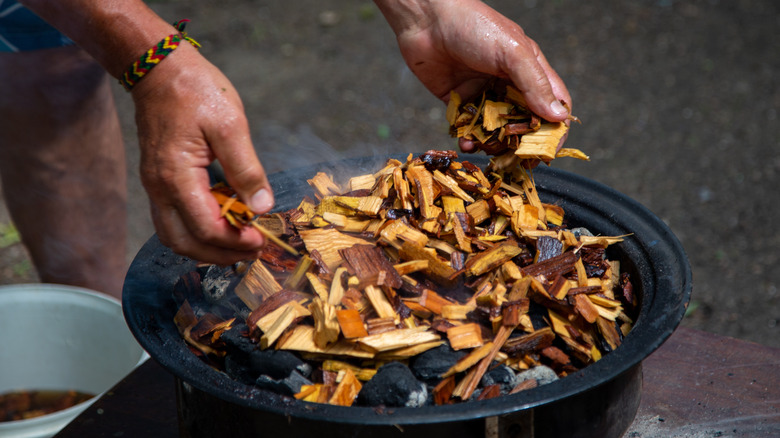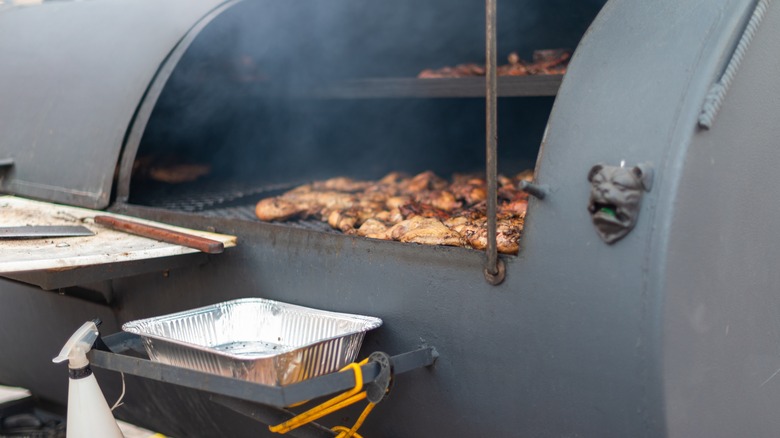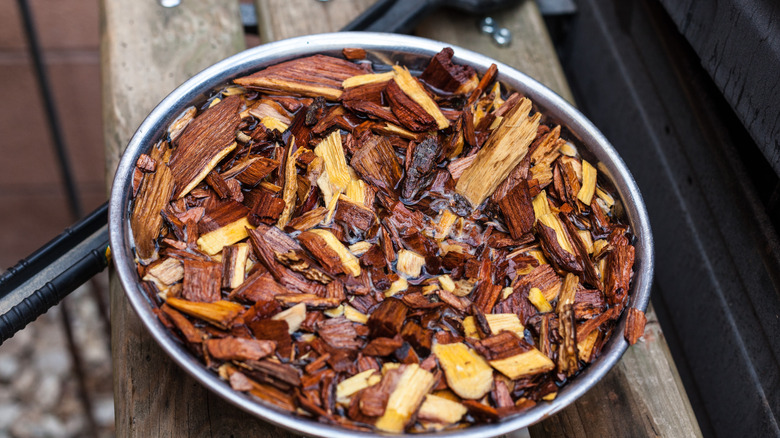How To Mix Wood Chips For A Totally Unique Flavor When Smoking Meats
Wood chips are a wonderful way to add extra flavor and a bit of smokiness to your meat. Most types of meat are quite welcoming to a bit of smoky flavor infusion, from seafood to poultry, pork, beef, and lamb. But you can't just grab a handful of wood chips and chuck them on the heat when cooking. Different woods have different flavor profiles that will either work with the meat you're preparing or not, so the trick is to match your wood chips to the meat.
Brazilian grill master and private chef, Silvio Correa, is an absolute whizz with anything barbecue and flavor related. We pinned him down to tap into some of his insights and recommendations on wood chips for smoking and great mixes that you can create for truly outstanding flavors in your meat. "I'm more of a mesquite charcoal guy, but for those who love wood chips, blending different types can add depth," Correa explained.
To start your info bank, it's important to know that woods like apple, cherry, plum, and maple are lighter woods that will impart a more gentle smoke into your meat. These you would use for more delicately flavored meats like seafood or chicken. Then you get your hardwoods like mesquite, hickory, pecan, oak, or juniper, which create much stronger smoke that works well with denser meats like beef, lamb, and venison (but here's why you should take care when smoking venison back strap). You can also get creative and mix your wood chips to create wonderful, unique, and highly complementary flavors that will take your meat to the next level.
Tips for mixing wood chips like a king
"A great trick is to mix a strong wood like hickory or mesquite with a milder fruitwood like apple or cherry," Correa suggests. "This balances smokiness with subtle sweetness, enhancing meats without overpowering them." Mixing two hardwoods can create a very strong smoke that kills the flavor of your meat, so all you'll be tasting is heavy and sometimes very bitter smoke.
Correa recommends oak and pecan as a great mix for poultry — they will give the meat a wonderfully warm and nutty aroma. You can also use a hickory and cherry mix if you're looking for that deeper, more naturally smokey flavor. But this mix is really "perfect with brisket, adding rich depth with a touch of sweetness," according to Correa. Other woods that work well with brisket include apple, oak, pecan, maple, and mesquite. The latter is quite a strong-flavored wood, falling into the hardwood category, so you'd take one of the gentler fruitwoods or medium woods and mix it in with the mesquite.
For pork fans, you've more than likely had apple sauce with your pork before. In the same vein, Correa recommends blending mesquite and apple wood chips: "Great for pork ribs, balancing smokiness with a hint of fruit." Pork also lights up with cherry, hickory, or maple woods, so choose your wood chip combinations based on the flavor you're looking for and what barbecue side dishes you'll be pairing it with.
Important things to avoid and take note of
Not all woods are made equal, and Correa notes that it's important to "avoid mixing very strong woods like mesquite with others that have a high resin content, like pine or cedar — these can create a bitter, acrid taste." Woods with this high resin content can release toxic smoke, which could infuse your meat with these poisonous gases, also giving a very bitter taste. Other woods to avoid for this reason include elm, cypress, fir, redwood, spruce, sycamore, eucalyptus, and (the name says it all) poison oak.
Correa recommends that you "be cautious with too much mesquite on lean meats, as it can easily overpower delicate flavors." Because of the low fat content in lean meats, the flavors tend to be gentle and light, so heavy smoke will not do these types of meat any justice. Your less dense meats like lean red meats, chicken, and seafood could handle a touch of mesquite mixed with some sweeter and softer woods.
A final piece of advice is to place your wood chips or wood chip mix in a stainless steel smoker box or piece of foil when you add them to the heat, to prevent them catching fire and releasing more bitter, overpowering smoke when it combusts into flame. Alternatively, soak your wood chips in water for 15 to 30 minutes prior to adding them to the heat.


